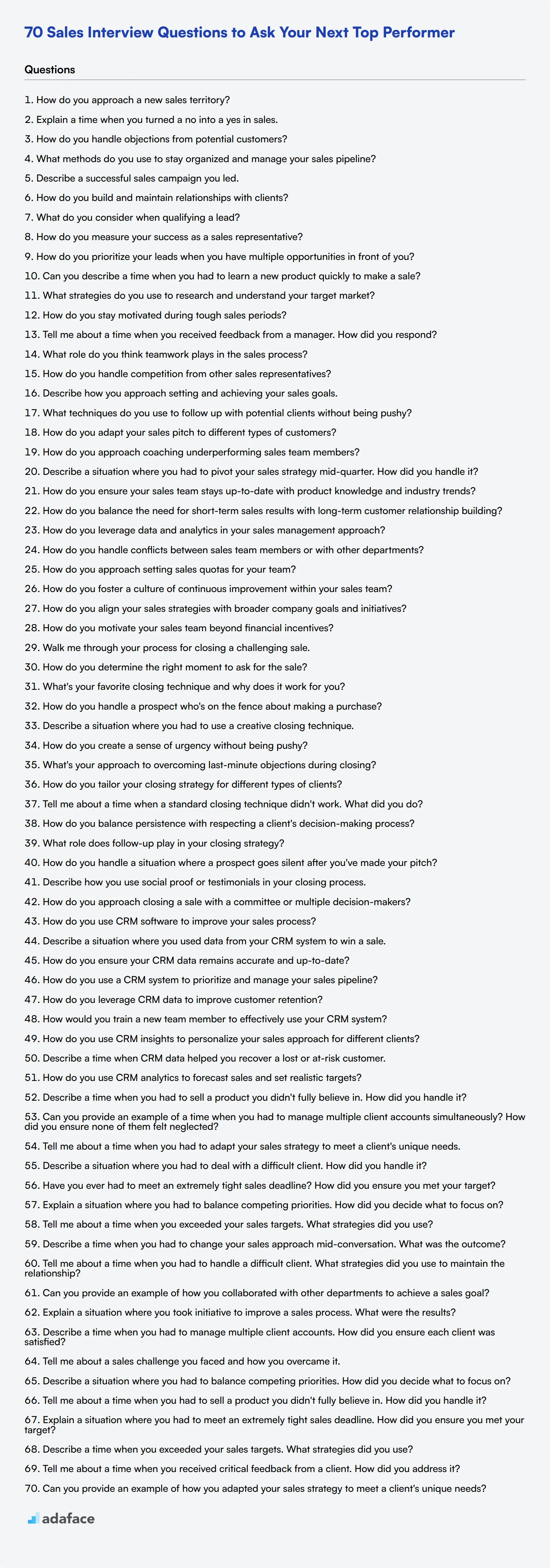Hiring the right sales professionals is crucial for the success of any business. By asking targeted sales interview questions, hiring managers can better discern candidates' skills and suitability for the role, ensuring they bring value to the team.
This blog post provides a comprehensive list of sales interview questions, with answers and guidance for various roles from junior executives to top representatives. We'll cover general questions, closing techniques, customer relationship management, situational scenarios, and behavioral assessments to help you identify the best talent.
Utilizing these questions will streamline your interview process and improve your chances of hiring top-performing sales professionals. Pair these insights with our Sales aptitude test to further evaluate candidates' potential before conducting interviews.
Table of contents
8 general Sales interview questions and answers
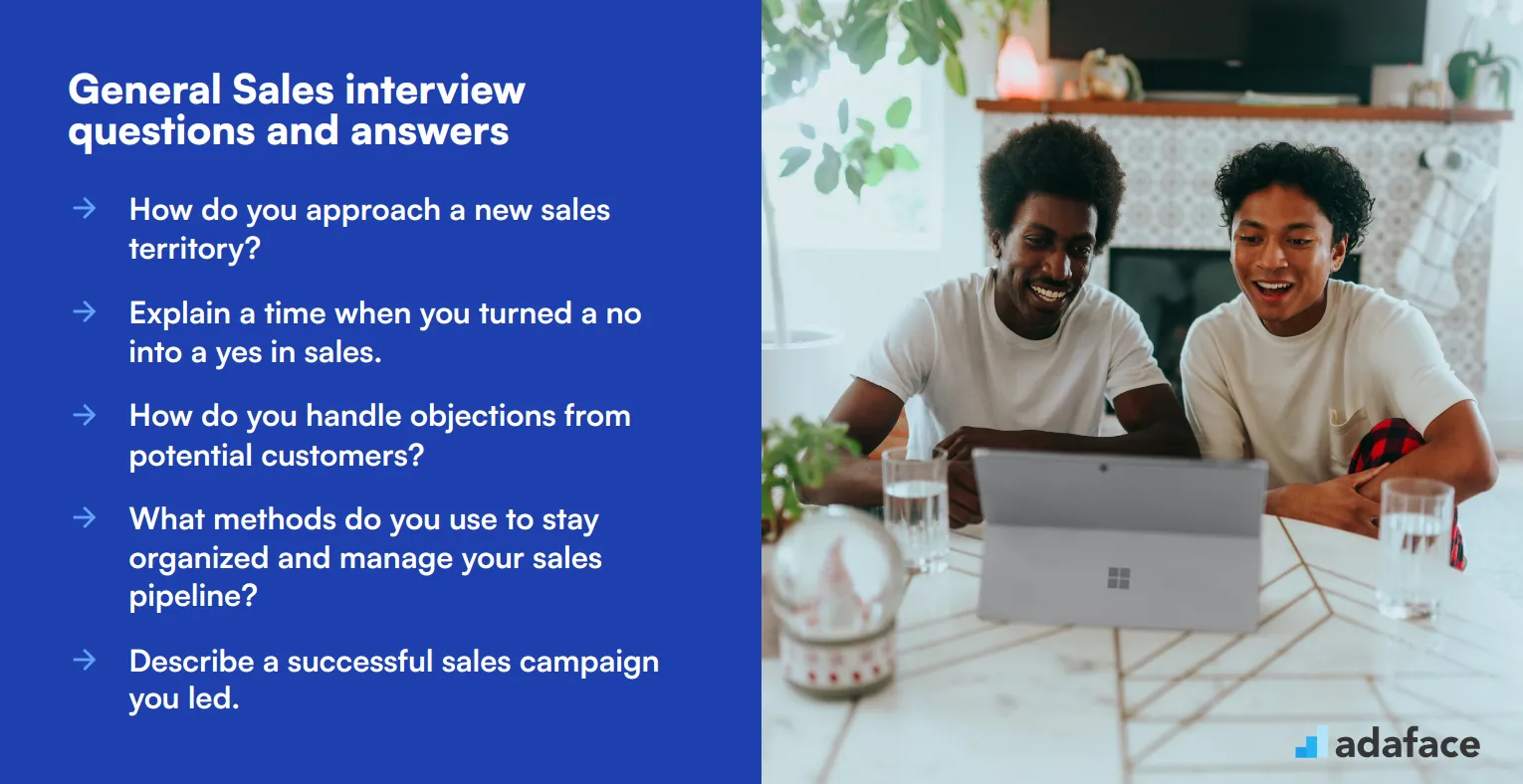
If you're a recruiter or hiring manager looking to identify the best sales talent, these 8 general sales interview questions and answers will help you uncover key insights about your candidates' skills and approaches. Use these questions to get beyond the surface and understand how they might perform in real-world sales scenarios.
1. How do you approach a new sales territory?
Approaching a new sales territory requires a strategic plan. First, I research the market to understand the potential customer base, competitors, and any unique challenges or opportunities within the region. Then, I prioritize outreach efforts by segmenting the territory into manageable sections and targeting high-potential prospects.
An ideal candidate should demonstrate a structured approach and an ability to gather and analyze relevant market data. Look for a response that includes proactive planning and adaptability.
2. Explain a time when you turned a no into a yes in sales.
One instance that stands out is when a potential client initially declined our service due to budget constraints. I took the time to understand their specific needs and pain points, then tailored a solution that fit within their budget by highlighting the long-term ROI and offering a flexible payment plan.
Look for candidates who show persistence, creativity, and a customer-focused approach. They should be able to articulate how they listened to the client's needs and found a win-win solution.
3. How do you handle objections from potential customers?
Handling objections is all about active listening and understanding the root of the concern. I acknowledge the customer's point of view, ask clarifying questions, and then provide information or alternatives that address their specific issues. This approach builds trust and demonstrates empathy.
An effective response will illustrate the candidate's ability to stay composed under pressure, communicate effectively, and problem-solve on the spot.
4. What methods do you use to stay organized and manage your sales pipeline?
I rely on a combination of CRM tools and time management techniques to stay organized. Using a CRM, I track all interactions with prospects and clients, set reminders for follow-ups, and monitor the progress of deals. Additionally, I prioritize tasks each day to ensure I'm focusing on high-value activities.
Candidates should show familiarity with sales tools and best practices for organization. Look for responses that emphasize efficiency and a systematic approach.
5. Describe a successful sales campaign you led.
In my previous role, I led a campaign targeting small businesses for our new software solution. After identifying key industries, I created personalized email sequences and followed up with phone calls. The campaign resulted in a 20% increase in sales within three months.
Ideal candidates will provide specific metrics and outcomes, demonstrating their ability to plan, execute, and measure the success of a campaign. Look for enthusiasm and attention to detail.
6. How do you build and maintain relationships with clients?
Building and maintaining client relationships involves regular communication and adding value beyond the initial sale. I schedule periodic check-ins, share relevant industry insights, and ensure they are satisfied with our product or service. I also address any issues promptly and proactively.
Look for responses that indicate a long-term relationship mindset, strong communication skills, and a commitment to customer success.
7. What do you consider when qualifying a lead?
When qualifying a lead, I consider factors like the lead's budget, authority to make purchasing decisions, need for our product, and timing. I ask targeted questions to gather this information and use it to prioritize leads that are most likely to convert.
Candidates should show an understanding of the BANT (Budget, Authority, Need, Timing) framework or similar qualification criteria. Look for analytical thinking and strategic prioritization.
8. How do you measure your success as a sales representative?
I measure my success using a combination of quantitative metrics such as sales numbers, conversion rates, and client retention rates. I also consider qualitative feedback from clients and colleagues to continuously improve my approach.
An ideal candidate will show a balanced focus on both metrics and client satisfaction. Look for responses that highlight a results-driven attitude and a commitment to continuous improvement.
10 Sales interview questions to ask junior executives
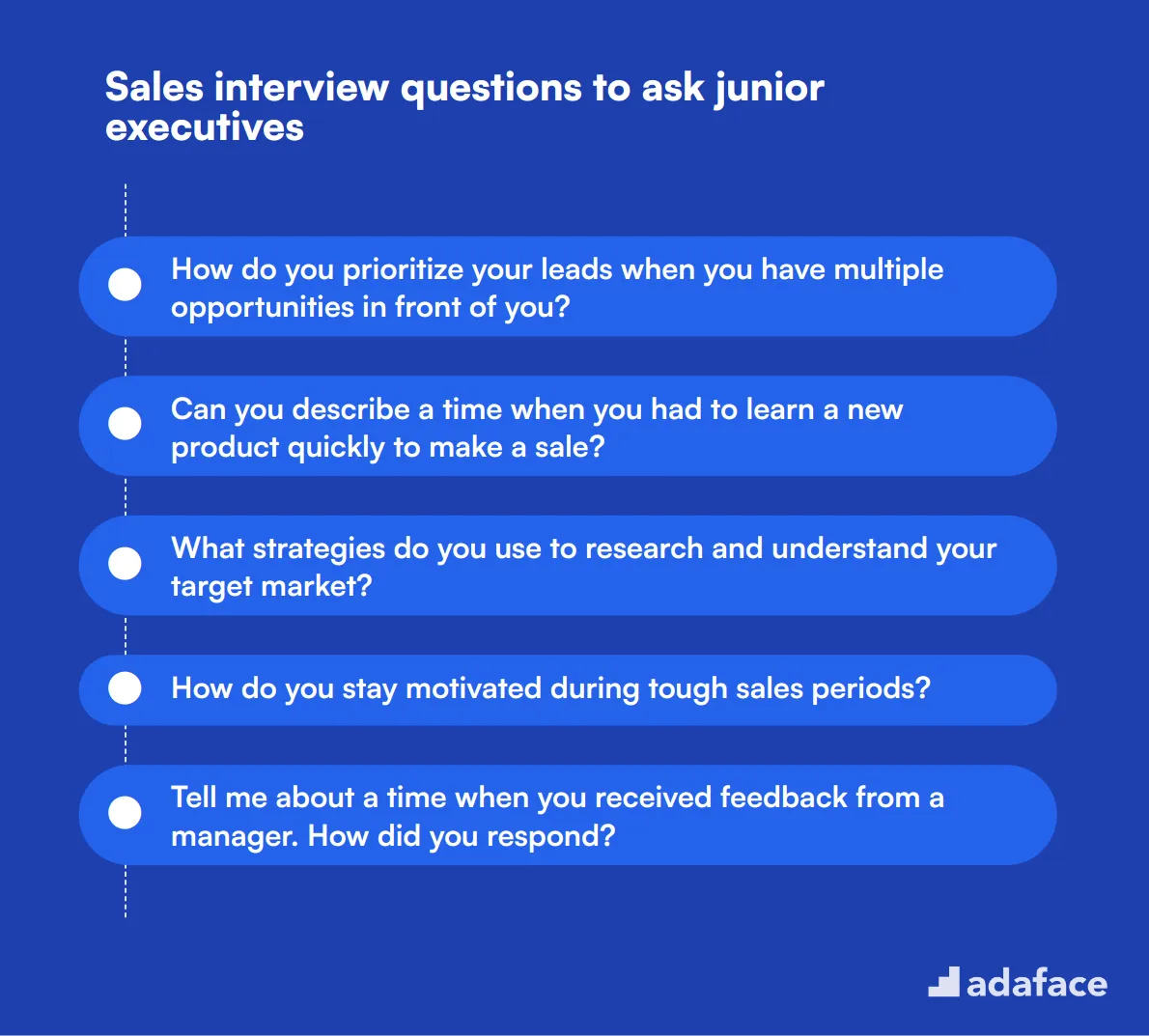
To evaluate whether junior sales executives possess the essential skills and mindset for success, utilize this curated list of interview questions. These queries will help you gauge their approach to sales challenges and interpersonal interactions. For detailed role expectations, refer to the sales representative job description.
- How do you prioritize your leads when you have multiple opportunities in front of you?
- Can you describe a time when you had to learn a new product quickly to make a sale?
- What strategies do you use to research and understand your target market?
- How do you stay motivated during tough sales periods?
- Tell me about a time when you received feedback from a manager. How did you respond?
- What role do you think teamwork plays in the sales process?
- How do you handle competition from other sales representatives?
- Describe how you approach setting and achieving your sales goals.
- What techniques do you use to follow up with potential clients without being pushy?
- How do you adapt your sales pitch to different types of customers?
10 intermediate Sales interview questions and answers to ask mid-tier managers
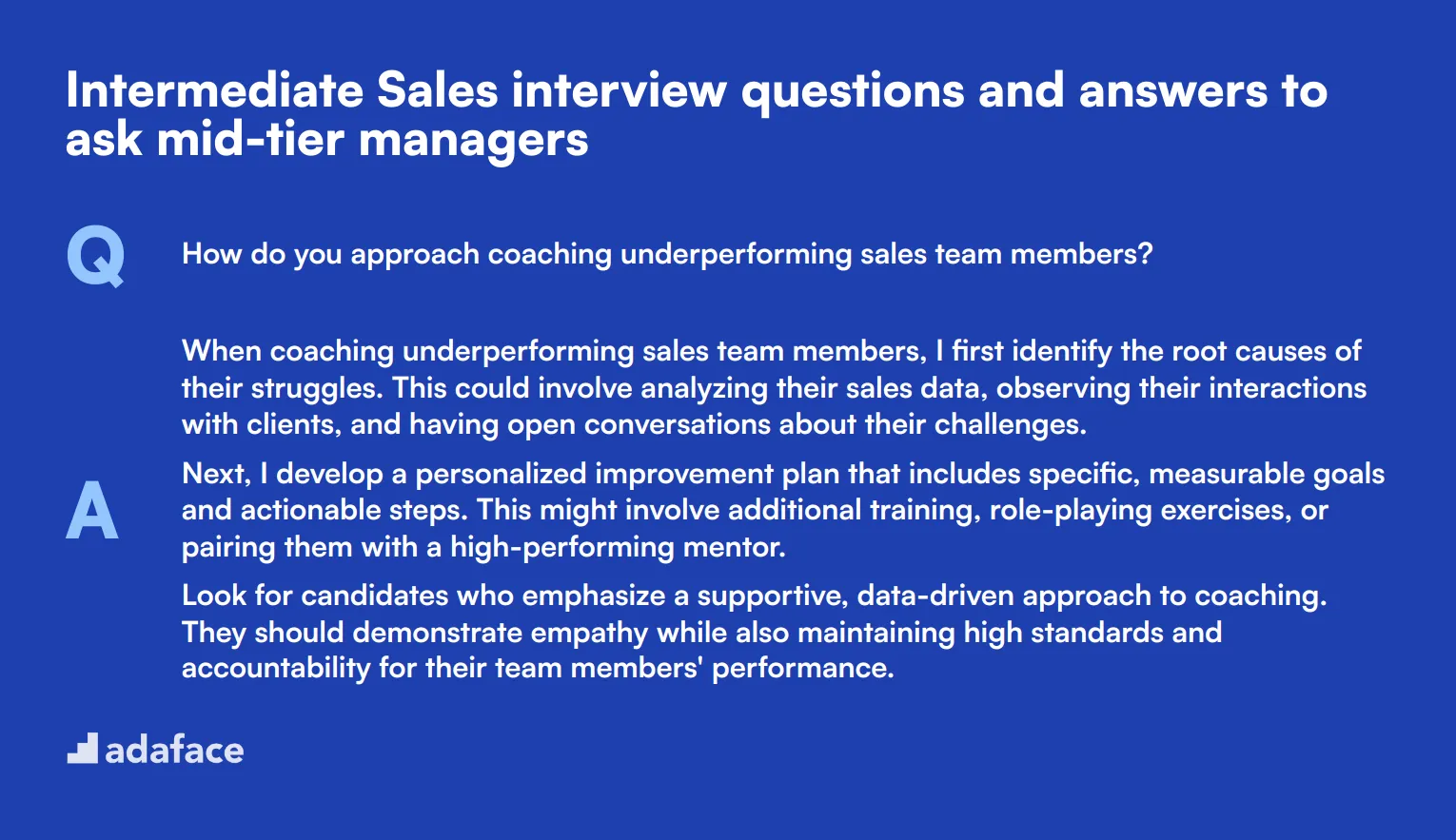
Ready to level up your sales team? These intermediate interview questions are perfect for assessing mid-tier managers. They'll help you gauge candidates' strategic thinking, leadership skills, and sales acumen. Use them to find that superstar who can take your sales force to new heights!
1. How do you approach coaching underperforming sales team members?
When coaching underperforming sales team members, I first identify the root causes of their struggles. This could involve analyzing their sales data, observing their interactions with clients, and having open conversations about their challenges.
Next, I develop a personalized improvement plan that includes specific, measurable goals and actionable steps. This might involve additional training, role-playing exercises, or pairing them with a high-performing mentor.
Look for candidates who emphasize a supportive, data-driven approach to coaching. They should demonstrate empathy while also maintaining high standards and accountability for their team members' performance.
2. Describe a situation where you had to pivot your sales strategy mid-quarter. How did you handle it?
A strong answer would include a specific example, such as: 'We noticed our main product wasn't gaining traction in a new market. I quickly analyzed the data, consulted with the product team, and realized we needed to adjust our messaging and target audience.'
The candidate should then explain how they implemented the change, such as retraining the sales team, adjusting marketing materials, and reaching out to a different set of prospects. They should also mention the results of their pivot.
Pay attention to how the candidate demonstrates adaptability, decisive action, and the ability to lead their team through change. Look for evidence of data-driven decision-making and effective communication skills.
3. How do you ensure your sales team stays up-to-date with product knowledge and industry trends?
An effective sales manager should have a multi-faceted approach to keeping their team informed. This might include regular product training sessions, subscribing to industry newsletters, and encouraging attendance at relevant conferences or webinars.
They might also implement a knowledge-sharing system within the team, such as a weekly 'lunch and learn' where team members take turns presenting on new developments or successful strategies.
Look for candidates who emphasize the importance of continuous learning and can provide specific examples of how they've fostered a culture of knowledge acquisition in their previous roles. They should also mention how they measure the effectiveness of these efforts, such as through improved sales performance or customer feedback.
4. How do you balance the need for short-term sales results with long-term customer relationship building?
A skilled sales manager understands that both short-term results and long-term relationships are crucial for sustainable success. They might discuss strategies such as setting balanced KPIs that include both immediate sales metrics and customer satisfaction scores.
The candidate might also mention the importance of training their team to identify opportunities for upselling and cross-selling within existing customer relationships, thus achieving both goals simultaneously.
Look for answers that demonstrate strategic thinking and a holistic view of sales success. The ideal candidate should be able to articulate how they communicate this balance to their team and how they handle situations where these goals might conflict.
5. How do you leverage data and analytics in your sales management approach?
An effective sales manager should be able to discuss specific ways they use data to inform their decisions and strategies. This might include using CRM analytics to identify trends in customer behavior, sales pipeline analysis to forecast future performance, or A/B testing to optimize sales messaging.
They should also be able to explain how they make data accessible and understandable to their team, perhaps through regular reports or dashboards that highlight key metrics and actionable insights.
Look for candidates who demonstrate a data-driven approach to sales management, but also understand the importance of balancing data with human insight and experience. They should be able to give examples of how data analysis has led to tangible improvements in their team's performance.
6. How do you handle conflicts between sales team members or with other departments?
A skilled sales manager should emphasize the importance of addressing conflicts promptly and professionally. They might describe a step-by-step approach, such as first listening to all parties involved, identifying the root cause of the conflict, and then working collaboratively to find a solution.
For interdepartmental conflicts, they might discuss the importance of fostering cross-functional relationships and understanding the goals and constraints of other teams. They could mention strategies like regular sync-ups or joint projects to improve collaboration.
Look for candidates who demonstrate strong communication and mediation skills. They should emphasize the importance of maintaining a positive team culture while also addressing issues directly. Ask for specific examples of conflicts they've resolved successfully in the past.
7. How do you approach setting sales quotas for your team?
An effective sales manager should describe a data-driven approach to setting quotas. This might include analyzing historical performance data, market trends, and company growth goals. They should also consider individual rep capabilities and territories when assigning quotas.
The candidate might discuss the importance of making quotas challenging yet achievable, and how they communicate the rationale behind quotas to their team. They could also mention strategies for regularly reviewing and adjusting quotas as needed.
Look for answers that demonstrate a balance between pushing for growth and setting realistic expectations. The ideal candidate should also discuss how they motivate their team to meet and exceed quotas, and how they handle situations where quotas are consistently missed.
8. How do you foster a culture of continuous improvement within your sales team?
A strong sales manager should emphasize the importance of creating a learning environment. They might discuss implementing regular training sessions, encouraging peer-to-peer learning, or setting up a mentorship program within the team.
The candidate could also mention how they use performance data to identify areas for improvement, both at the team and individual level. They might discuss how they encourage experimentation with new sales techniques or technologies, and how they celebrate and share successes.
Look for candidates who demonstrate a commitment to personal and team growth. They should be able to provide specific examples of how they've implemented continuous improvement initiatives in the past and the results they've achieved. Also, pay attention to how they measure the success of these efforts.
9. How do you align your sales strategies with broader company goals and initiatives?
An effective sales manager should demonstrate a clear understanding of how sales objectives connect to overall company strategy. They might discuss regular meetings with leadership to stay informed about company direction, and how they translate this into actionable sales strategies.
The candidate could explain how they communicate company goals to their team and align individual and team targets accordingly. They might also mention how they adjust sales approaches or target markets based on shifts in company focus.
Look for answers that show strategic thinking and the ability to see the bigger picture. The ideal candidate should be able to give examples of how they've successfully aligned their sales efforts with company initiatives in the past, and how this alignment contributed to both sales success and overall company growth.
10. How do you motivate your sales team beyond financial incentives?
While financial incentives are important, a skilled sales manager should recognize that motivation comes from various sources. They might discuss strategies such as creating a positive team culture, offering opportunities for professional development, or implementing non-monetary recognition programs.
The candidate could also mention the importance of understanding individual motivators for each team member. They might discuss how they use regular one-on-ones to understand personal goals and align work assignments accordingly.
Look for answers that demonstrate a nuanced understanding of motivation. The ideal candidate should be able to provide specific examples of non-financial motivational strategies they've implemented and the positive impact these had on team performance and morale.
14 Sales questions related to closing techniques
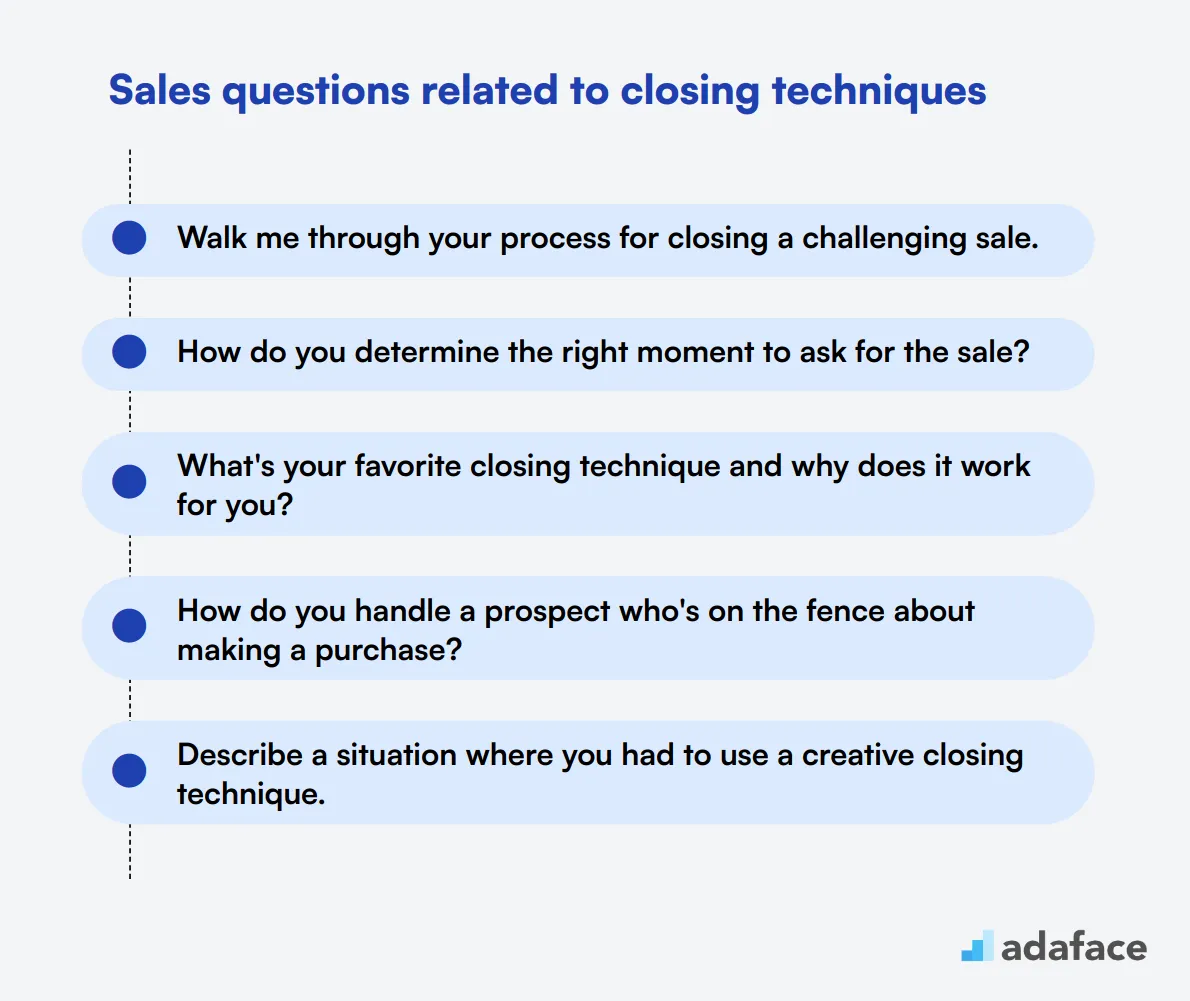
To assess a candidate's closing techniques, use these questions during your sales interviews. They'll help you gauge how effectively applicants can seal deals and drive revenue for your company.
- Walk me through your process for closing a challenging sale.
- How do you determine the right moment to ask for the sale?
- What's your favorite closing technique and why does it work for you?
- How do you handle a prospect who's on the fence about making a purchase?
- Describe a situation where you had to use a creative closing technique.
- How do you create a sense of urgency without being pushy?
- What's your approach to overcoming last-minute objections during closing?
- How do you tailor your closing strategy for different types of clients?
- Tell me about a time when a standard closing technique didn't work. What did you do?
- How do you balance persistence with respecting a client's decision-making process?
- What role does follow-up play in your closing strategy?
- How do you handle a situation where a prospect goes silent after you've made your pitch?
- Describe how you use social proof or testimonials in your closing process.
- How do you approach closing a sale with a committee or multiple decision-makers?
9 Sales interview questions and answers related to customer relationship management
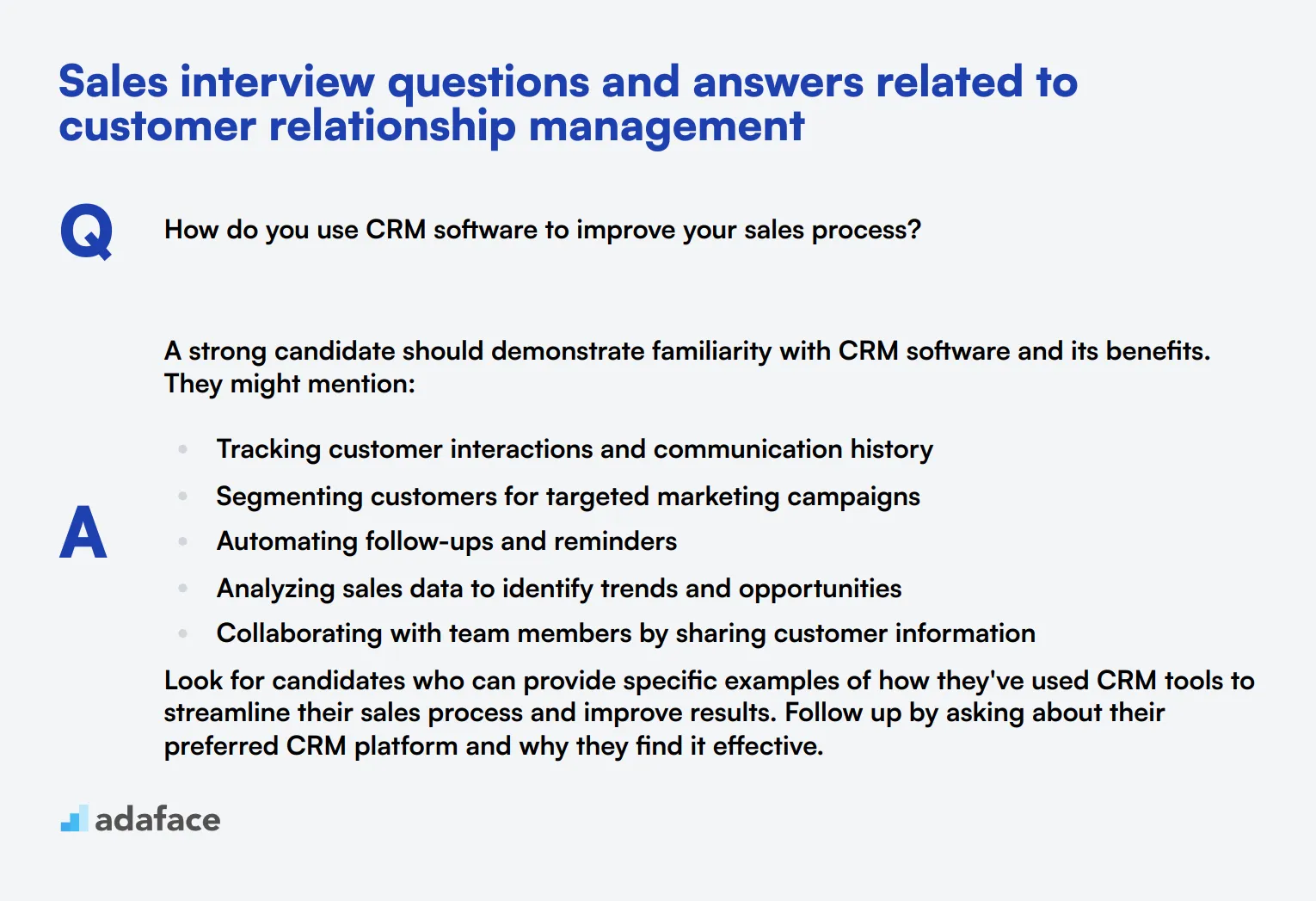
Customer relationship management (CRM) is the backbone of successful sales. These questions will help you gauge how candidates approach customer relationships and use CRM tools effectively. Use them to uncover a candidate's ability to nurture leads, manage client data, and drive long-term customer satisfaction.
1. How do you use CRM software to improve your sales process?
A strong candidate should demonstrate familiarity with CRM software and its benefits. They might mention:
- Tracking customer interactions and communication history
- Segmenting customers for targeted marketing campaigns
- Automating follow-ups and reminders
- Analyzing sales data to identify trends and opportunities
- Collaborating with team members by sharing customer information
Look for candidates who can provide specific examples of how they've used CRM tools to streamline their sales process and improve results. Follow up by asking about their preferred CRM platform and why they find it effective.
2. Describe a situation where you used data from your CRM system to win a sale.
An ideal response should showcase the candidate's ability to leverage CRM data for strategic decision-making. They might describe:
- Identifying a customer's pain points based on previous interactions
- Personalizing their pitch using the client's purchase history
- Timing their outreach based on the customer's engagement patterns
- Cross-selling or upselling by analyzing related product purchases
Pay attention to how the candidate connects CRM data to actionable insights. A strong answer will demonstrate their analytical skills and their ability to translate data into tangible sales outcomes.
3. How do you ensure your CRM data remains accurate and up-to-date?
Candidates should emphasize the importance of data integrity in CRM systems. A good answer might include:
- Regularly reviewing and updating customer information
- Implementing data entry standards across the team
- Using data validation tools to catch errors
- Encouraging team members to input data in real-time
- Conducting periodic data audits
Look for candidates who understand that accurate CRM data is crucial for effective sales strategies. They should demonstrate a proactive approach to maintaining data quality and recognize its impact on sales performance.
4. How do you use a CRM system to prioritize and manage your sales pipeline?
A strong candidate should demonstrate their ability to use CRM tools for efficient pipeline management. They might discuss:
- Categorizing leads based on their stage in the sales funnel
- Using lead scoring to focus on high-potential prospects
- Setting up automated alerts for follow-ups and deadlines
- Analyzing win/loss ratios to refine sales strategies
- Forecasting sales based on pipeline data
Pay attention to how the candidate balances using CRM features with their own judgment. The ideal response should show they use the CRM as a tool to enhance their decision-making, not replace it.
5. How do you leverage CRM data to improve customer retention?
An effective answer should highlight the candidate's understanding of using CRM for long-term customer relationships. They might mention:
- Analyzing purchase patterns to anticipate customer needs
- Setting up automated check-ins or satisfaction surveys
- Identifying at-risk customers based on engagement metrics
- Personalizing communication based on customer preferences and history
- Creating targeted loyalty programs or special offers
Look for candidates who recognize the value of existing customers and can articulate strategies to use CRM data proactively for retention. Their answer should demonstrate a balance between acquiring new customers and nurturing existing relationships.
6. How would you train a new team member to effectively use your CRM system?
A strong response should showcase the candidate's understanding of CRM best practices and their ability to mentor others. They might outline a training approach that includes:
- Providing an overview of the CRM's key features and benefits
- Demonstrating practical, day-to-day usage scenarios
- Sharing best practices for data entry and management
- Explaining how to generate and interpret reports
- Offering ongoing support and addressing questions
Look for candidates who emphasize the importance of consistent CRM usage across the team. Their answer should reflect their own expertise with the system and their ability to communicate its value to others.
7. How do you use CRM insights to personalize your sales approach for different clients?
An ideal answer should demonstrate the candidate's ability to tailor their sales strategy using CRM data. They might discuss:
- Analyzing past interactions to understand client preferences
- Using purchase history to identify cross-selling opportunities
- Customizing pitches based on the client's industry or company size
- Timing outreach based on the client's engagement patterns
- Personalizing content or product recommendations
Look for candidates who show creativity in using CRM data to create unique, client-specific approaches. Their answer should reflect a deep understanding of how to translate data into personalized sales strategies.
8. Describe a time when CRM data helped you recover a lost or at-risk customer.
A strong response should illustrate the candidate's problem-solving skills and ability to leverage CRM data effectively. They might describe:
- Identifying the customer's pain points through historical data
- Analyzing the customer's engagement drop-off to pinpoint issues
- Using purchase history to create a tailored win-back offer
- Timing the outreach based on the customer's past responsiveness
- Collaborating with team members using shared CRM notes
Pay attention to how the candidate balances data insights with personal touch. The ideal answer should demonstrate their ability to use CRM data as a tool to enhance, not replace, relationship-building skills.
9. How do you use CRM analytics to forecast sales and set realistic targets?
An effective answer should show the candidate's analytical skills and strategic thinking. They might mention:
- Analyzing historical sales data to identify trends and patterns
- Using pipeline data to project future sales
- Factoring in seasonality and market conditions
- Segmenting forecasts by product lines or customer types
- Regularly reviewing and adjusting forecasts based on real-time data
Look for candidates who demonstrate a data-driven approach to goal-setting. Their answer should reflect an understanding of how CRM analytics can inform both individual and team targets, as well as overall business strategy.
7 situational Sales interview questions with answers for hiring top representatives
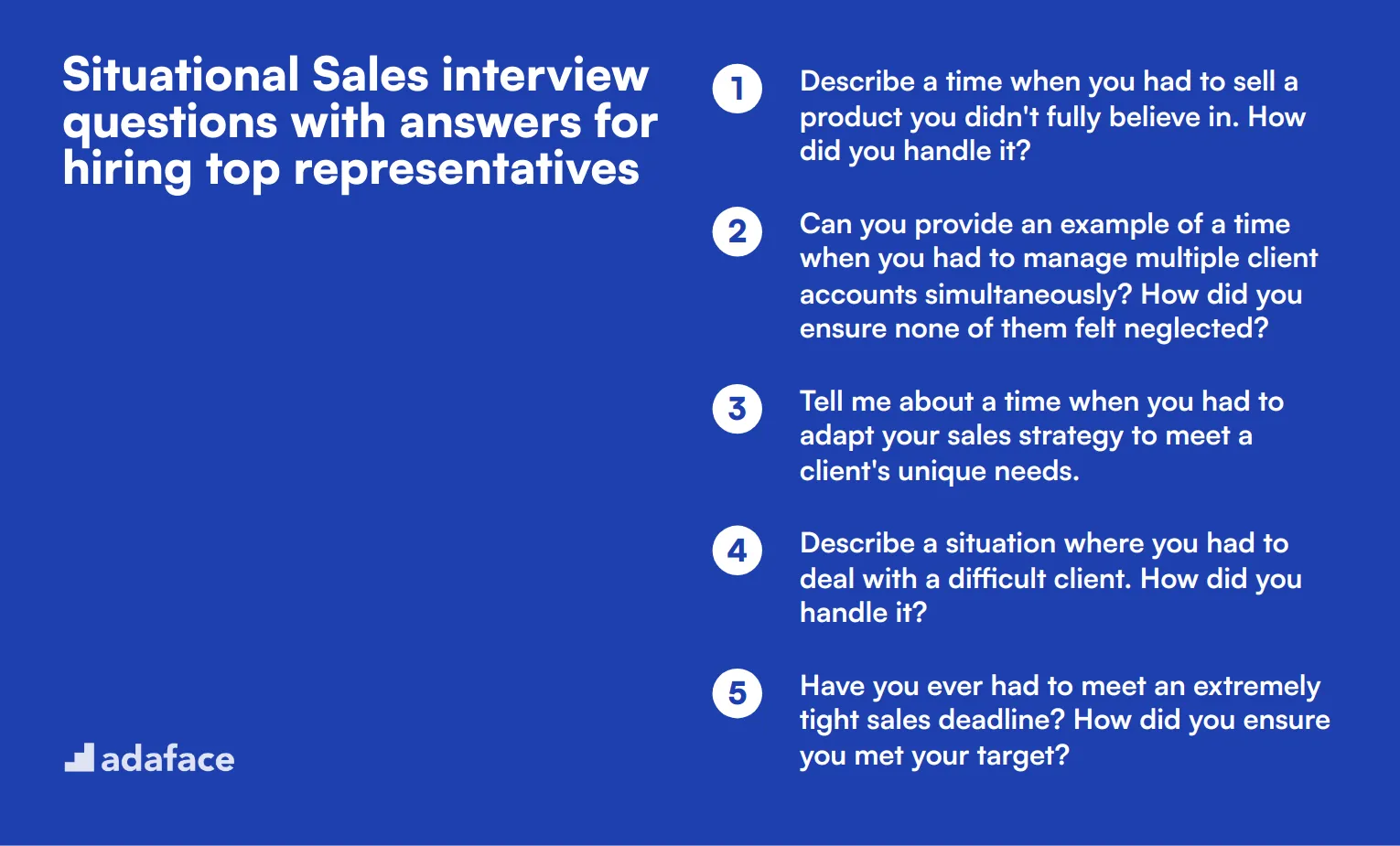
When it comes to hiring top sales representatives, situational interview questions can be your secret weapon. These questions not only reveal a candidate's skills and experience but also how they think on their feet and handle real-world challenges. Use this list during your interview process to uncover the true potential of your applicants.
1. Describe a time when you had to sell a product you didn't fully believe in. How did you handle it?
Candidates should discuss their approach to maintaining professionalism and commitment even when they have reservations about a product. They might mention how they focused on the product's strengths and benefits to the customer, rather than their personal opinions.
They may also highlight their strategies for staying motivated, such as setting personal goals or seeking feedback from satisfied customers. Look for answers that demonstrate resilience, adaptability, and a positive attitude.
An ideal response should show that the candidate can handle less-than-ideal situations gracefully and still achieve sales targets. Follow up by asking about the outcome and any lessons learned.
2. Can you provide an example of a time when you had to manage multiple client accounts simultaneously? How did you ensure none of them felt neglected?
The candidate should outline their time management and organizational skills. They might mention using CRM systems to keep track of client interactions and setting regular check-ins to maintain relationships.
They could also discuss prioritizing tasks based on client needs and deadlines, ensuring that all clients receive timely and attentive service. Look for specific tools or methods they use to stay organized.
A strong answer will demonstrate the candidate's ability to multitask without sacrificing the quality of service. Follow up by asking how they handled any conflicts or competing priorities.
3. Tell me about a time when you had to adapt your sales strategy to meet a client's unique needs.
Candidates should provide a detailed example of a situation where they identified a client's specific requirements and adjusted their approach accordingly. They might mention conducting thorough research and customizing their pitch to address the client's pain points.
They could also discuss collaborating with other team members or departments to develop a tailored solution. Look for evidence of creativity and problem-solving skills.
An ideal response will show that the candidate is flexible and customer-focused. Follow up by asking about the outcome and any feedback they received from the client.
4. Describe a situation where you had to deal with a difficult client. How did you handle it?
The candidate should explain their approach to understanding the client's concerns and finding a resolution. They might mention active listening, empathy, and maintaining a calm and professional demeanor.
They could also discuss specific strategies they used to turn the situation around, such as offering solutions or negotiating compromises. Look for examples of de-escalation and conflict resolution skills.
A strong answer will demonstrate the candidate's ability to handle challenging interactions effectively. Follow up by asking about the long-term impact on the client relationship.
5. Have you ever had to meet an extremely tight sales deadline? How did you ensure you met your target?
Candidates should discuss their experience with high-pressure situations and how they managed their time and resources to meet the deadline. They might mention setting clear priorities, staying focused, and leveraging their network for support.
They could also highlight any specific tactics or tools they used to stay on track and motivated. Look for evidence of strong time management and goal-setting skills.
An ideal response will show that the candidate can perform well under pressure and deliver results. Follow up by asking about the outcome and any lessons learned.
6. Explain a situation where you had to balance competing priorities. How did you decide what to focus on?
The candidate should provide a clear example of a time when they had multiple competing tasks or goals. They might mention using a prioritization framework, such as the Eisenhower matrix, to decide what to focus on first.
They could also discuss how they communicated with stakeholders to set expectations and make sure everyone was on the same page. Look for examples of effective communication and decision-making skills.
A strong answer will demonstrate the candidate's ability to balance multiple priorities without dropping the ball. Follow up by asking how they handled any conflicts or trade-offs.
7. Tell me about a time when you exceeded your sales targets. What strategies did you use?
Candidates should share specific strategies or tactics they used to surpass their sales goals. They might mention setting ambitious but realistic targets, staying disciplined in their sales activities, and leveraging their network for referrals.
They could also discuss how they tracked their progress and adjusted their approach as needed to stay on course. Look for evidence of goal-setting, perseverance, and adaptability.
An ideal response will show that the candidate has a proven track record of exceeding expectations. Follow up by asking about any challenges they faced and how they overcame them.
12 behavioral Sales interview questions
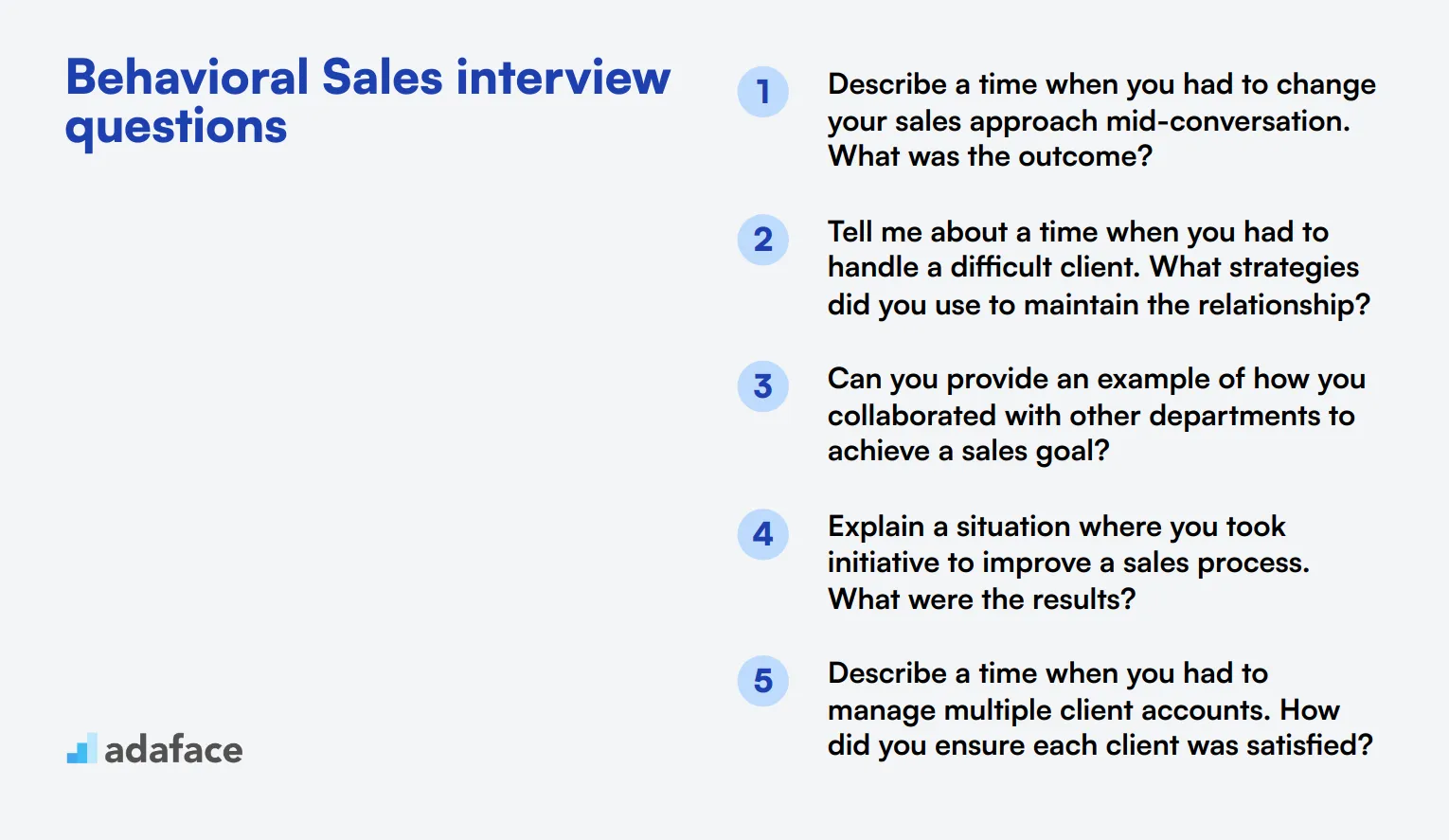
To gauge the behavioral competencies of your candidates, use these 12 behavioral sales interview questions during your interview process. These questions are designed to help you understand how potential hires react in real-world scenarios and assess their problem-solving skills under pressure.
- Describe a time when you had to change your sales approach mid-conversation. What was the outcome?
- Tell me about a time when you had to handle a difficult client. What strategies did you use to maintain the relationship?
- Can you provide an example of how you collaborated with other departments to achieve a sales goal?
- Explain a situation where you took initiative to improve a sales process. What were the results?
- Describe a time when you had to manage multiple client accounts. How did you ensure each client was satisfied?
- Tell me about a sales challenge you faced and how you overcame it.
- Describe a situation where you had to balance competing priorities. How did you decide what to focus on?
- Tell me about a time when you had to sell a product you didn't fully believe in. How did you handle it?
- Explain a situation where you had to meet an extremely tight sales deadline. How did you ensure you met your target?
- Describe a time when you exceeded your sales targets. What strategies did you use?
- Tell me about a time when you received critical feedback from a client. How did you address it?
- Can you provide an example of how you adapted your sales strategy to meet a client's unique needs?
Which Sales skills should you evaluate during the interview phase?
While it's not feasible to assess every aspect of a candidate's potential in a single interview, focusing on key sales skills can provide valuable insights. These core skills will help you gauge a candidate's fit for your sales team and their ability to drive results.
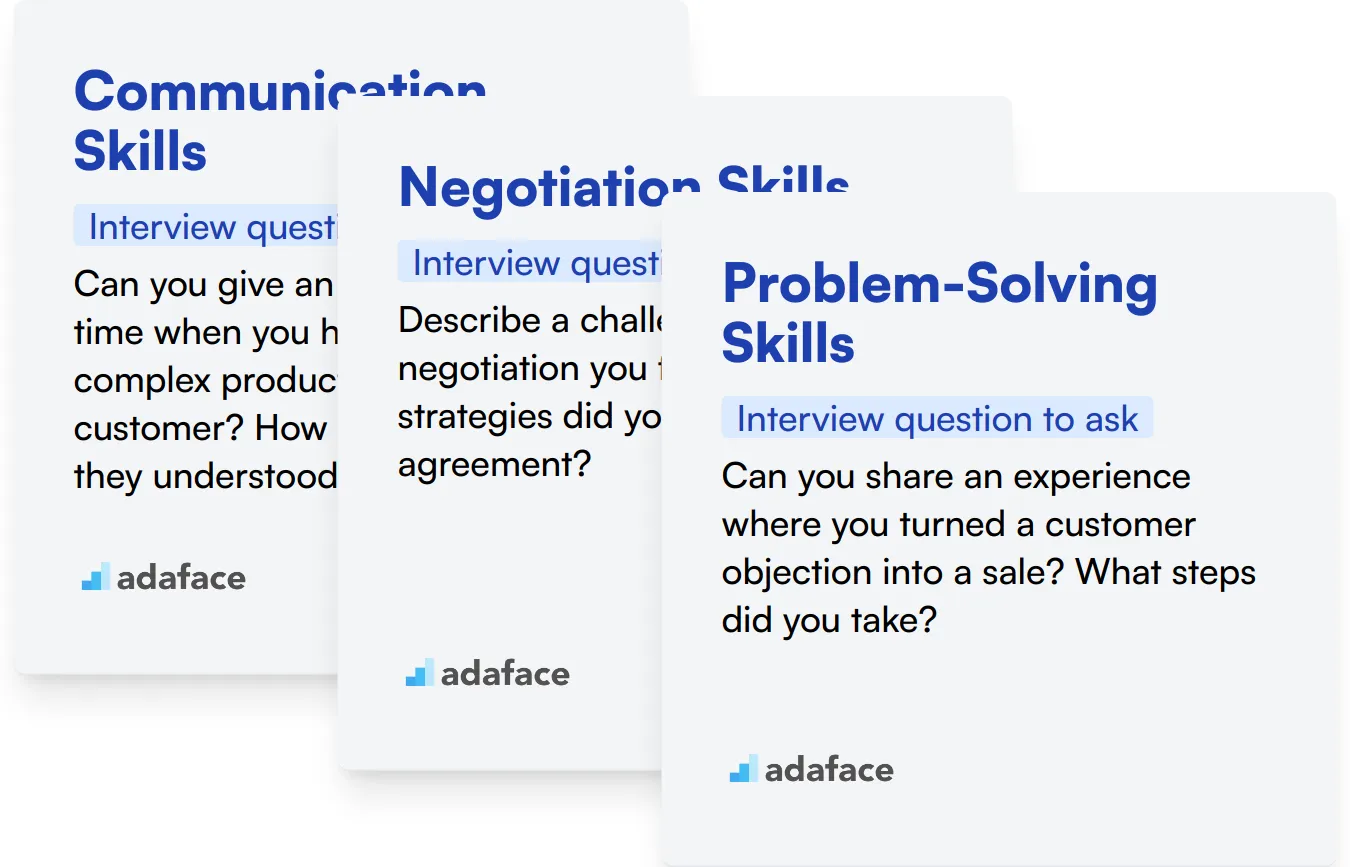
Communication Skills
Consider using an assessment test focused on communication skills to efficiently identify candidates who excel in this area. You can explore the Sales Aptitude Test for relevant questions.
You can also ask targeted interview questions to evaluate their communication skills more directly. One effective question to consider is:
Can you give an example of a time when you had to explain a complex product or service to a customer? How did you ensure they understood?
When asking this question, look for clarity, persuasiveness, and the candidate's ability to tailor their message to the audience's level of understanding. Their response should reflect not only their communication style but also their empathy and adaptability.
Negotiation Skills
To better assess negotiation skills, consider utilizing a tailored assessment test featuring relevant multiple-choice questions. While we currently do not have a specific test for negotiation skills outlined, you can explore the Sales Aptitude Test for valuable insights.
In addition to assessments, asking the right interview questions can provide deeper insights. A compelling question to pose is:
Describe a challenging negotiation you faced. What strategies did you use to reach an agreement?
Pay attention to how the candidate describes their approach, focusing on their strategies, adaptability, and the outcome. Strong candidates will illustrate their thought process and how they navigate complex discussions.
Problem-Solving Skills
To assess candidates' problem-solving abilities, consider using an assessment test that includes relevant MCQs. The Sales Aptitude Test can be a great resource for identifying these skills.
Additionally, you can ask specific interview questions to evaluate their problem-solving aptitude. A valuable question to ask might be:
Can you share an experience where you turned a customer objection into a sale? What steps did you take?
Listen for the candidate's ability to analyze the situation, respond creatively, and demonstrate resilience. Their answer should reflect a proactive approach to overcoming challenges in the sales process.
Maximizing the Effectiveness of Sales Interview Questions
Before putting your newly acquired knowledge to use, consider these tips to enhance your sales interview process. These strategies will help you make the most of your interview questions and candidate evaluations.
1. Incorporate Skills Tests in Your Screening Process
Skills tests provide objective data on candidates' abilities, complementing subjective interview assessments. They help narrow down the candidate pool and ensure you're interviewing the most qualified individuals.
For sales roles, consider using a sales aptitude test to evaluate core competencies. Additionally, a communication test can assess verbal skills, while a situational judgment test gauges decision-making abilities.
Implement these tests after initial resume screening but before interviews. This approach saves time by focusing your interviews on candidates who have demonstrated baseline skills, allowing for more in-depth conversations during the interview stage.
2. Curate a Balanced Set of Interview Questions
Time is limited during interviews, so selecting the right mix of questions is key. Focus on questions that reveal candidates' sales expertise, problem-solving skills, and cultural fit.
Include a blend of behavioral, situational, and technical questions. Consider adding relevant questions from other areas, such as business development or customer service, to get a well-rounded view of the candidate's capabilities.
Tailor your question set based on the specific sales role and your company's needs. This targeted approach ensures you're evaluating candidates on the most relevant aspects for success in your organization.
3. Master the Art of Follow-Up Questions
Asking follow-up questions is crucial for uncovering the depth of a candidate's experience and thought process. It helps distinguish between rehearsed answers and genuine understanding, providing insights into how candidates think on their feet.
For example, after asking about a candidate's biggest sale, follow up with, "What specific strategies did you use to close that deal?" This probes into their sales techniques and problem-solving abilities, revealing valuable information about their approach to complex sales situations.
Leverage Skill Tests to Select Competent Sales Professionals
If you're aiming to hire individuals with top-notch sales skills, it's important to verify these capabilities thoroughly. The most straightforward way to assess these skills is through targeted skill tests. Explore our Sales Aptitude Test or Customer Service Test to ensure you're evaluating the right talents.
After applying these tests, you can efficiently shortlist the best candidates for interviews. To proceed with hiring top-tier talent, consider signing up on our platform. Get started by visiting our sign-up page or explore more about our testing capabilities on our Assessment Platform overview.
Sales Aptitude Test
Download Sales interview questions template in multiple formats
Sales Interview Questions FAQs
This post covers general, junior executive, mid-tier manager, closing techniques, customer relationship management, situational, and behavioral sales interview questions.
The number of questions varies by category, ranging from 7 to 20, totaling 80 questions across all sections.
Yes, many of the questions come with sample answers to help interviewers evaluate candidate responses effectively.
The post includes a section on maximizing interview effectiveness and suggests using skill tests to complement the interview process.

40 min skill tests.
No trick questions.
Accurate shortlisting.
We make it easy for you to find the best candidates in your pipeline with a 40 min skills test.
Try for freeRelated posts
Free resources




